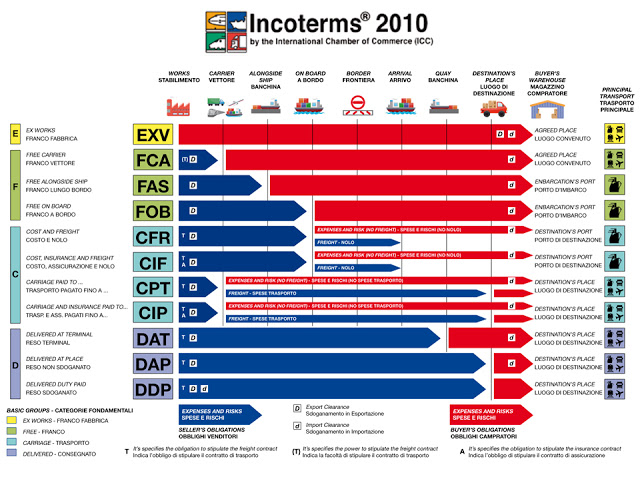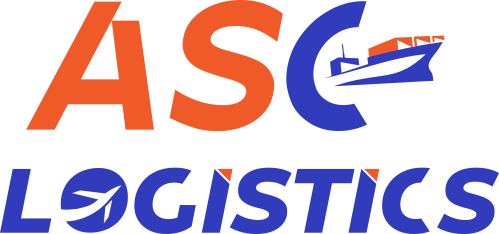INCOTERMS AND THINGS TO KNOW
ASC Logistics would like to introduce Incoterms, conditions Incoterms like. Through this article we will list and analyze all Incoterms terms, factors related to these Incoterms trade terms.
What is Incoterms? What is Incoterms 2010?
The International Commercial Terms is a set of international trade rules issued by the International Chamber of Commerce (ICC) in Paris, France. announced. Incoterms are recognized and widely used around the world. Incoterms prescribe rules related to prices and responsibilities of the parties (the seller and the buyer) in an international trade operation, in particular the international sale of goods between entities in countries different.

INCOTERMS regulates detailed terms related to freight forwarding, responsibilities of related parties such as responsible for many deliveries of the seller, responsibility of receiving the buyer, who will pay transfer, insurance, risk transfer to the parties and when? And other issues such as customs clearance, place of delivery.
Incoterms will be mutually agreed upon by the parties in the International Trade Agreement, but some Incoterms will not be mentioned, so the parties should take note to add other issues to their International Trade Agreement. Copper is tight and ensures the mechanism of implementation as well as dispute resolution. Additional contents such as: Payment method (by L / C, bank transfer, or delivery to ship owner ...); Bill of lading payment, fine, compensation; standard goods; Dispute Resolution ... It is important to note that Incoterms are only part of the Contract, not the entire International Trade Agreement.
Incoterm versions
The current Incoterms 2010 Incoterms was issued by the International Chamber of Commerce (ICC) in Paris, France and entered into force on 1 January 2011.
The previous Incoterms Incoterms 2000, over the past 10 years since the Incoterms 2000 went into effect, the global business environment, international trade practices, transportation, information technology, security. There have been many changes so updating the version of Incoterms 2010 is necessary.
Old version - Incoterms 2000 contains 13 sample delivery conditions, divided into 4 groups: C, D, E, F. In this case, group E contains one condition (EXW), group F consists of three conditions (FCA , FAS, FOB), group C includes 4 conditions.
Basic content Incoterms 2010
International Chamber of Commerce International Chamber of Commerce has announced the incoterm 2010 content began to apply from January 1, 2011.
Incoterms 2010 only includes 11 terms, down 2 terms (DDU & DAF) over incoterm 2000.
Incoterms 2010 is divided into two groups:
+ Terms of use for any type of transportation?
+ EXW - Ex Works - Delivered at the workshop
+ FCA - Free Carrier
+ CPT - Carriage Paid To - Carriage Paid To
+ CIP - Carriage and Insurance Paid
+ DAT - Delivered At Terminal (new) - Delivery on site (new terms)
+ DAP - Delivered At Place (new) - Delivery at destination (new terms)
+ DDP - Delivered Duty Paid - Delivered Duty Paid
Terms used only for inland or inland shipping:
+ FAS - Free Alongside Ship
+ FOB - Free On Board
+ CFR - Cost and Freight
+ CIF - Cost, Insurance and Freight
Reduce from 13 to 11 terms, add two new terms, Delivered at Terminal and Delivered at Place - Delivered at Frontier - Delivered at Frontier - DES, Delivered at Place -ship), DEQ (Delivered Ex-Quay) and DDU (Delivered Duty Unpaid).
The 2010 Incoterm indicates the obligation to provide information regarding security issues in the declaration such as security information declarations and other information.
Unlike some speculators of FAS, the FAS provision is retained in the 2010 Incoterms as it is still in use for BULK and Break Bulk deliveries.
The following ideas are only considered as reference guides and people can save
Note: ALL TERMS IN INCOTERM MUST BE CONNECTED AFTER A LOCATION. For example:, DAT Ho Chi Minh City, FOB Hai Phong, EXW Hanoi. (In case of a large place, we can specify: EXW Tan Son Nhat, Ho Chi Minh City).
BASIC GUIDELINES OF TERMS OF INCOTERM 2010
1. Terms used for any type of transportation:
EXW (Ex Works) - Delivery at the workshop
The buyer will bear the full cost and risk of bringing the seller from the beginning to the end. The seller is responsible for ordering the buyer at the place of delivery (factory, factory, warehouse). This clause represents the minimum liability of the seller. This clause is used for all forms of transportation
FCA (Free Carrier) - Delivered to the carrier
The seller is obliged to deliver the goods and carry out the export procedures until delivery to the designated carrier by the buyer at the designated point or place. If the buyer does not specify the exact place of delivery, the seller will choose from the points or places where the carrier will receive the goods. When the seller is required to assist in finding and signing a contract with the carrier, the liability and expense of the buyer will be incurred. This clause is used for all forms of transportation
CPT (Carriage Paid To) - Payed to
The seller pays the freight to the destination. The risk of damage and loss of goods after the goods have been delivered to the carrier will be transferred from the seller to the buyer. This clause seller is responsible for the export procedure. This clause is also used for all forms of transportation.
Carriage & insurance Paid to
The seller is obliged to do the same as the CPT but has the additional responsibility to purchase the insurance for the risk of damage or loss of goods during the transportation. The seller is obliged to do the export procedures, but only the responsibility to buy insurance at the lowest level. This clause permits use with all types of transportation.
DAT (Delivered At Terminal)
This is a new addition to Incoterms 2010. This condition can be used for all types of transportation.
The seller shall only be deemed to have delivered the goods when the goods are unloaded from the means of transport to the designated port or port or place of destination and placed under the disposal of the buyer. "Ben" includes wharves, warehouses, container yards or roads, railways or airport terminals. The two sides agree on the landing stage and if it is possible to specify the place in the wharf where the time of transferring the risk of goods from the seller to the buyer. If the seller bears the shipping costs from the terminal to another location, the DAP or DDP terms will apply.
Responsibility
The seller is obliged to place the order to the place stated in the contract.
The seller is obliged to ensure that their contract is for a contract of sale
The seller is obliged to do the export procedures
Buyers are obliged to do import procedures, customs procedures and pay taxes
If the parties agree that the seller bears the costs and risks from the destination to another location, the DAP
DAP (Delivered At Place)
This is a new addition to Incoterms 2010. This condition can be used for all types of transportation.
The seller delivers the goods when the goods have been placed under the disposal of the buyer on the means of transport that has arrived at the destination and is ready for loading the goods to the destination. The parties are advised to identify as much as possible the point of delivery at the destination area, as it is the time when the goods are delivered from the seller to the buyer. If the seller is obliged to carry out import procedures, pay tax ... DDP terms will apply.
Responsibility
The seller has the obligation and the delivery risk to the agreed place
The seller is required to sign a contract of carriage in accordance with the contract of sale
The seller is obliged to do the export procedures
The cost of unloading at the destination, if no prior agreement, the seller will not suffer
The buyer is obliged to assist in providing the necessary paperwork for customs and tax payments
DDP (Delivered Duty Paid) - Delivered Duty Paid
The seller is obliged to deliver the goods to the agreed location in the country of importation, including the payment of all costs and risks until the goods arrive at the destination, including the tax and customs declaration. This clause is irrespective of the mode of transportation.
2. Terms used only for inland or inland waterway transport:
FAS (Free Alongside Ship)
The seller is deemed to have fulfilled the delivery obligation when the goods are placed next to the ship at the port of shipment, from which the buyer will bear all the risk of the goods. Buyers are obliged to carry out export procedures. This clause shall only apply to sea or inland waterway transport.
FOB (Free On Board)
Buyers bear all costs and risks immediately after delivery through the ship's rail at the port of export. Buyers are obliged to carry out export procedures. This clause applies only to sea or inland waterway transport.
CFR (Cost and FReight)
The seller bears the costs and returns the freight to the port of destination. The moment of risk transfer from the seller to the person
Please contact us for a free consultation from A - Z when importing goods via hotline: 090.328.8872 (Mr Thang)
See more:
>> Customs Brokerage Service
>> Service of import and export cargo
>> Bonded warehouse services
>> Inspection services for import and export
>> License service
>> Other Logistics Services
>> Airline book services
>> Marine book services
>> Road transport service
Related Products
Tags: What are incoterms, incoterms, incoterms?


.jpg)

/(Dừa) Thủ tục xuất khẩu nông sản - dừa tươi - dừa kim cương/Thu-tuc-xuat-khau-nong-san---dua-tuoi---dua-kim-cuong.jpg)
/(Sầu riêng) Thủ tục xuất khẩu nông sản - sầu riêng đông lạnh/Thu-tuc-xuat-khau-nong-san---sau-rieng-dong-lanh-2.jpg)




